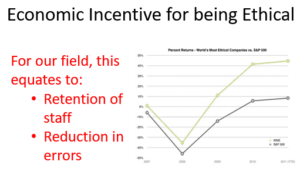ASHA ethics CEU requirements are becoming a part of the licensing process in many states. It seems strange at first when you think about it because SLPs are a pretty ethical bunch. Secondly, when you think about our limited time and all of the other continuing education we need to be focusing on, taking an SLP ethics CEU course doesn’t come to top of mind.
However, this is ultimately a good thing for our field and Speech Pathology is joining a vast number of professions requiring continual ethics training. Let’s talk about that first and then cover 5 ways for you to get your ASHA ethics CEU hours in a painless, interesting, fun way that will positively influence how you do your job.
Why Are There ASHA Ethics CEU Course Requirements?
Out of all of the professions that you can name, would you put speech pathology at the top for being unethical?
And Why Now?

Do you feel less ethical now than you did last year? What has changed in our national and international environment that has caused speech pathology and many professions to move in this direction?
Well, it turns out that there are major advantages to professional development focusing on ethics. The recent international environment has exposed challenges to how a group is perceived in the world. How “ethical” a group is considered, determines how much buy-in they get from other groups, how much they are trusted, and how much they are able to accomplish.
There are also economic incentives to being ethical, despite the idea to the contrary that people profit by “getting away with something.” Groups considered ethical are trusted and therefore more successful at lobbying for what they think is right. This can mean you as an SLP lobbying for services or our industry lobbying for insurance changes and pay raises.
And lastly, ethics is tied to job satisfaction and retention. We all know that ASHA is working to increase the number of speech pathologists in the field and there is a direct correlation between job satisfaction, feeling good about what you do (meaning feeling ethical) and more SLPs sticking around.
Take these studies from the field of law as an example:
“Two-thirds of respondents in a survey of California lawyers said they “compromise their professionalism as a result of economic pressure.”
“Lawyers in Maryland reported their profession had degenerated so badly that “they were often irritable, short-tempered, argumentative, and verbally abusive.”
Not a direction I think we would be willing to go in Speech Language Pathology.
Can People’s Ethical Behavior be Changed?
If you are going to spend your time on professional development, you want to know that it will have an impact on how you do things, right? So how does ASHA CEU ethics training fit into this?

The answer comes by way of some really intriguing psychological studies showing that just by studying and talking about ethics, people are more likely to act ethically and feel a connection to the group they are working with.
For example, in a study conducted at some of the country’s major universities, student ethical behavior while taking an exam improved by introducing the topic of ethics before they began. You can hear more about this study and some other really interesting ones on the first ASHA ethics CEU course we list below.
We’ve built a showcase of ethics courses on topics at the forefront of some of the stickiest situations we face: high caseloads, personal interactions, and serving diverse communities.

Ethical Considerations for Culturally and Linguistically Diverse Populations
Successfully navigate contentious situations when confronted with an ethical dilemma. Learn about the origin of ethics, how professions address ethical issues, and dissect intriguing case studies supplied by speech language pathologists. We explore HOW and WHY we encounter ethical situations and WHAT we can do to eliminate such situations in the future.

Ethically Reduce Your Caseload
SLPs cite large caseloads as being one of their greatest concerns. Yet, most continuing education shows how to get students onto our caseload or diagnose and treat students, rather than get them off our caseload. This ASHA ethics CEU course presents research and methods for reducing caseloads both ethically and effectively.

How Ethics and Biases Shape Our Decisions: A Fun Look at Research on Heuristics
In this course, we shared fun and provocative research collected by Nobel Prize Winner Daniel Kahneman on how we are all susceptible to our own biases and look at it through the lens of being a speech language pathologist.

Navigating Ethical Predicaments in Your Work with Diverse Students
You never expected to find yourself in an ethical predicament in the field of speech-language pathology, did you? Whether it’s due to using published tools that don’t quite fit our students or not being completely sure about whether a bilingual student has a difference or a disorder, many of us have found ourselves in uncomfortable situations. In this course, we address these situations head on and provide approaches to avoid them in the future.

Earn ASHA ethics CEUs for speech language pathology with these fun, informative explorations of ethical dilemmas in our field.


Just after I finished the Navigating Ethical Predicaments course, I noticed it is listed on your website as being a DEI course and does not mention being a course that will meet the ethics requirement as well. Will it?